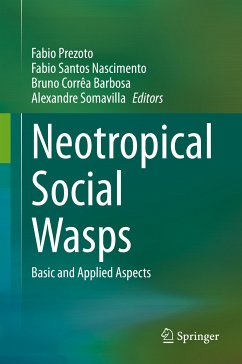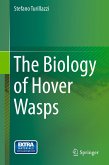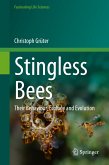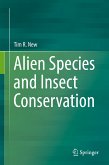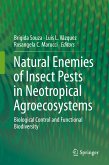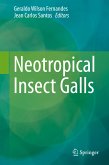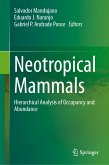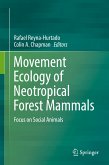Neotropical Social Wasps (eBook, PDF)
Basic and applied aspects
Redaktion: Prezoto, Fabio; Somavilla, Alexandre; Barbosa, Bruno Corrêa; Nascimento, Fabio Santos
121,95 €
121,95 €
inkl. MwSt.
Sofort per Download lieferbar

61 °P sammeln
121,95 €
Als Download kaufen

121,95 €
inkl. MwSt.
Sofort per Download lieferbar

61 °P sammeln
Jetzt verschenken
Alle Infos zum eBook verschenken
121,95 €
inkl. MwSt.
Sofort per Download lieferbar
Alle Infos zum eBook verschenken

61 °P sammeln
Neotropical Social Wasps (eBook, PDF)
Basic and applied aspects
Redaktion: Prezoto, Fabio; Somavilla, Alexandre; Barbosa, Bruno Corrêa; Nascimento, Fabio Santos
- Format: PDF
- Merkliste
- Auf die Merkliste
- Bewerten Bewerten
- Teilen
- Produkt teilen
- Produkterinnerung
- Produkterinnerung

Bitte loggen Sie sich zunächst in Ihr Kundenkonto ein oder registrieren Sie sich bei
bücher.de, um das eBook-Abo tolino select nutzen zu können.
Hier können Sie sich einloggen
Hier können Sie sich einloggen
Sie sind bereits eingeloggt. Klicken Sie auf 2. tolino select Abo, um fortzufahren.

Bitte loggen Sie sich zunächst in Ihr Kundenkonto ein oder registrieren Sie sich bei bücher.de, um das eBook-Abo tolino select nutzen zu können.
This book provides updated information on this intriguing and exciting group of insects: Neotropical Social Wasps. These insects have a particular biology and their colonies are formed by a few cooperative females living in either small or massive, structured nests where stinging individuals organize their activities and defend their offspring. Topics include evolutionary aspects, biogeography, post-embryonic development, community behavior and ecology, economic importance, and research methods.
- Geräte: PC
- ohne Kopierschutz
- eBook Hilfe
- Größe: 16.84MB
Andere Kunden interessierten sich auch für
![The Biology of Hover Wasps (eBook, PDF) The Biology of Hover Wasps (eBook, PDF)]() Stefano TurillazziThe Biology of Hover Wasps (eBook, PDF)113,95 €
Stefano TurillazziThe Biology of Hover Wasps (eBook, PDF)113,95 €![Stingless Bees (eBook, PDF) Stingless Bees (eBook, PDF)]() Christoph GrüterStingless Bees (eBook, PDF)97,95 €
Christoph GrüterStingless Bees (eBook, PDF)97,95 €![Alien Species and Insect Conservation (eBook, PDF) Alien Species and Insect Conservation (eBook, PDF)]() Tim R. NewAlien Species and Insect Conservation (eBook, PDF)73,95 €
Tim R. NewAlien Species and Insect Conservation (eBook, PDF)73,95 €![Natural Enemies of Insect Pests in Neotropical Agroecosystems (eBook, PDF) Natural Enemies of Insect Pests in Neotropical Agroecosystems (eBook, PDF)]() Natural Enemies of Insect Pests in Neotropical Agroecosystems (eBook, PDF)161,95 €
Natural Enemies of Insect Pests in Neotropical Agroecosystems (eBook, PDF)161,95 €![Neotropical Insect Galls (eBook, PDF) Neotropical Insect Galls (eBook, PDF)]() Neotropical Insect Galls (eBook, PDF)113,95 €
Neotropical Insect Galls (eBook, PDF)113,95 €![Neotropical Mammals (eBook, PDF) Neotropical Mammals (eBook, PDF)]() Neotropical Mammals (eBook, PDF)161,95 €
Neotropical Mammals (eBook, PDF)161,95 €![Movement Ecology of Neotropical Forest Mammals (eBook, PDF) Movement Ecology of Neotropical Forest Mammals (eBook, PDF)]() Movement Ecology of Neotropical Forest Mammals (eBook, PDF)113,95 €
Movement Ecology of Neotropical Forest Mammals (eBook, PDF)113,95 €-
-
-
This book provides updated information on this intriguing and exciting group of insects: Neotropical Social Wasps. These insects have a particular biology and their colonies are formed by a few cooperative females living in either small or massive, structured nests where stinging individuals organize their activities and defend their offspring. Topics include evolutionary aspects, biogeography, post-embryonic development, community behavior and ecology, economic importance, and research methods.
Dieser Download kann aus rechtlichen Gründen nur mit Rechnungsadresse in A, B, BG, CY, CZ, D, DK, EW, E, FIN, F, GR, HR, H, IRL, I, LT, L, LR, M, NL, PL, P, R, S, SLO, SK ausgeliefert werden.
Produktdetails
- Produktdetails
- Verlag: Springer International Publishing
- Seitenzahl: 472
- Erscheinungstermin: 7. November 2020
- Englisch
- ISBN-13: 9783030535100
- Artikelnr.: 62036119
- Verlag: Springer International Publishing
- Seitenzahl: 472
- Erscheinungstermin: 7. November 2020
- Englisch
- ISBN-13: 9783030535100
- Artikelnr.: 62036119
- Herstellerkennzeichnung Die Herstellerinformationen sind derzeit nicht verfügbar.
Fábio Santos Nascimento: bachelor in Biological Sciences (1997) and master in Zoology at the Universidade Federal de Juiz de Fora (1998). PhD. in Entomology at the Universidade de São Paulo (2003). Post-doctoral experience at the University of Sheffield (2005) and Fulbright Visiting Scholar at Boston University (2013). Since 2009 is Associate Professor of Universidade de São Paulo, Ribeirão Preto campus. Experience in Behavioral Ecology, focusing on Sociobiology, focusing on the following subjects: Chemical Ecology, Reproductive conflict and its Resolution, social insects. Fábio Prezoto: bachelor's in Biological Sciences at Universidade Estadual Paulista Júlio de Mesquita Filho (1993), master's in Zoology at Universidade Estadual Paulista Júlio de Mesquita Filho (1997) and PhD in Zoology at Universidade Estadual Paulista Júlio de Mesquita Filho (2001). Experience in Zoology, focusing on Zoology, specialist in the following subjects: behavior, ecology,social wasp, behavioral ecology and foraging behavior. Full Professor of Universidade Federal de Juiz de Fora and Coordinator of the Graduate program of Animal Behavior. Bruno Corrêa Barbosa: Post-doctoral experience at the University of Juiz de Fora (2019). PhD. in Ecology at the Federal University of Juiz de Fora (2019), master master in Zoology (2015) and bachelor in Biological Sciences (2012). Experience in the Zoology and Ecology with focus in animal behavior, community ecology and ecological interactions of social wasps. Alexandre Somavilla: Post-doctorate in progress at the National Institute of Amazonian Research (INPA); PhD in Biological Sciences, area of concentration in Entomology at the National Institute of Amazonian Research (INPA) (2016), with an Internship at the American Museum of Natural History (New York, USA) (2015-2016); Master's degree in Biological Sciences, area of concentration in Entomology, at the National Institute of Amazonian Research (INPA) (2012) and graduation at the University of Santa Cruz do Sul (2009). He has experience in the area of Zoology and Ecology, with emphasis in Entomology, which has worked with Diversity of Social Wasps of the Amazon and systematics of wasps using morphological and molecular data.
A Brief Review Of Studies On Social Wasps In Brazil.- The Evolution of Swarm Founding in the Wasps: Possible Scenarios.- The foraging behaviour of neotropical social wasps.- The choice of sexual partner in social wasps.- Nesting Habits of Neotropical Social Wasps.- Castes and polymorphisms in neotropical social wasps.- The biology of swarm-founding epiponine wasp, Polybia paulsita.- Causes and consequences of reproductive conflicts in wasp societies.- Post-embryonic Development in Brazilian Social Wasps.- Evolution and adaptation of the wings and mandibles of neotropical social wasps.- Cuticular hydrocarbon studies in Neotropical Social Wasps.- Biogeographic hypotheses for the Neotropical Social Wasps.- Chromosome diversity and evolution in Neotropical social wasps.- Phylogeny and classification of the Neotropical social wasps.- List of species of social wasps from Brazil.- The Old-World versus New-World social wasps: Similarities, differences and threats.- Key to the genera of social wasps (Polistinae) occurring in Brazil.- Research techniques used in the study of social wasps.- Community ecology of social wasps in Brazil: Forty years of studies.- lnteractions between wasps and other animals: associations and natural enemies.- Interactions of social wasps with microorganisms.- Artificial Environments for Studying Eusocial Wasps.- Economic importance of Neotropical Social Wasps.
A Brief Review Of Studies On Social Wasps In Brazil.- The Evolution of Swarm Founding in the Wasps: Possible Scenarios.- The foraging behaviour of neotropical social wasps.- The choice of sexual partner in social wasps.- Nesting Habits of Neotropical Social Wasps.- Castes and polymorphisms in neotropical social wasps.- The biology of swarm-founding epiponine wasp, Polybia paulsita.- Causes and consequences of reproductive conflicts in wasp societies.- Post-embryonic Development in Brazilian Social Wasps.- Evolution and adaptation of the wings and mandibles of neotropical social wasps.- Cuticular hydrocarbon studies in Neotropical Social Wasps.- Biogeographic hypotheses for the Neotropical Social Wasps.- Chromosome diversity and evolution in Neotropical social wasps.- Phylogeny and classification of the Neotropical social wasps.- List of species of social wasps from Brazil.- The Old-World versus New-World social wasps: Similarities, differences and threats.- Key to the genera of social wasps (Polistinae) occurring in Brazil.- Research techniques used in the study of social wasps.- Community ecology of social wasps in Brazil: Forty years of studies.- lnteractions between wasps and other animals: associations and natural enemies.- Interactions of social wasps with microorganisms.- Artificial Environments for Studying Eusocial Wasps.- Economic importance of Neotropical Social Wasps.
